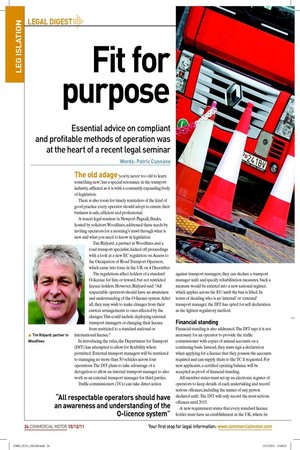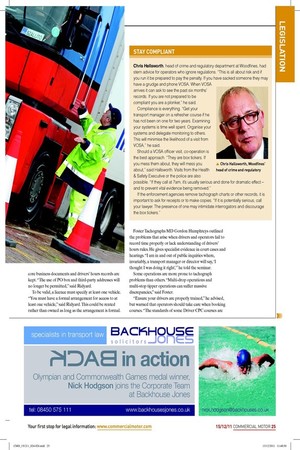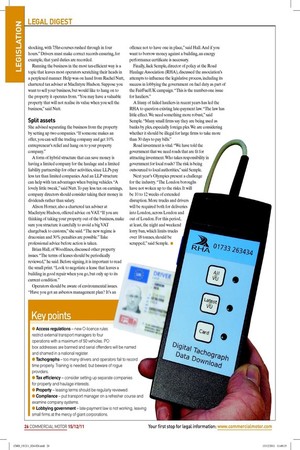Fit for purpose
Page 20

Page 21

Page 22

If you've noticed an error in this article please click here to report it so we can fix it.
Essential advice on compliant and profitable methods of operation was at the heart of a recent legal seminar
Words: Patric Cunnane The old adage ‘you’re never too old to learn something new’, has a special resonance in the transport industry, aflicted as it is with a constantly expanding body of legislation.
There is also room for timely reminders of the kind of good practice every operator should adopt to ensure their business is safe, eficient and professional.
A recent legal seminar in Newport Pagnall, Bucks, hosted by solicitors Woodines, addressed these needs by inviting operators for a morning’s trawl through what is new and what you need to know in legislation.
Tim Ridyard, a partner in Woodines and a road transport specialist, kicked off proceedings with a look at a new EC regulation on Access to the Occupation of Road Transport Operator, which came into force in the UK on 4 December.
The regulations affect holders of a standard O-licence for hire or reward, but not restricted licence holders. However, Ridyard said: “All respectable operators should have an awareness and understanding of the O-licence system. After all, they may wish to make changes from their current arrangements to ones affected by the changes. This could include deploying external transport managers or changing their licence from restricted to a standard national or international licence.” In introducing the rules, the Department for Transport (DfT) has attempted to allow for lexibility where permitted. External transport managers will be restricted to managing no more than 50 vehicles across four operations. The DfT plans to take advantage of a derogation to allow an internal transport manager to also work as an external transport manager for third parties.
Trafic commissioners (TCs) can take direct action against transport managers; they can declare a transport manager unit and specify rehabilitation measures. Such a measure would be entered into a new national register, which applies across the EU until the ban is lifted. In terms of deciding who is an ‘internal’ or ‘external’ transport manager, the DfT has opted for self declaration as the lightest regulatory method.
Financial standing
Financial standing is also addressed. The DfT says it is not necessary for an operator to provide the trafic commissioner with copies of annual accounts on a continuing basis. Instead, they must sign a declaration when applying for a licence that they possess the accounts required and can supply them to the TC if requested. For new applicants, a certiied opening balance will be accepted as proof of inancial standing.
All member states must set up an electronic register of operators to keep details of each undertaking and record serious offences, including the names of any person declared unit. The DfT will only record the most serious offences until 2015.
A new requirement states that every standard licence holder must have an establishment in the UK, where its core business documents and drivers’ hours records are kept. “The use of PO box and third-party addresses will no longer be permitted,” said Ridyard.
To be valid, a licence must specify at least one vehicle. “You must have a formal arrangement for access to at least one vehicle,” said Ridyard. This could be rented
Bteyco dv //11 2
rather than owned as long as the arrangement is formal. Foster Tachographs MD Gordon Humphreys outlined the problems that arise when drivers and operators fail to record time properly or lack understanding of drivers’ hours rules. He gives specialist evidence in court cases and hearings. “I am in and out of public inquiries where, invariably, a transport manager or director will say, ‘I thought I was doing it right’,” he told the seminar.
Some operations are more prone to tachograph problems than others. “Multi-drop operations and multi-stop tipper operations can suffer massive discrepancies,” said Foster.
“Ensure your drivers are properly trained,” he advised, but warned that operators should take care when booking courses. “The standards of some Driver CPC courses are shocking, with 7.5hr-courses rushed through in four hours.” Drivers must make correct records ensuring, for example, that yard duties are recorded.
Running the business in the most tax-eficient way is a topic that leaves most operators scratching their heads in a perplexed manner. Help was on hand from Rachel Nutt, chartered tax adviser at MacIntyre Hudson. Suppose you want to sell your business, but would like to hang on to the property it operates from. “You may have a valuable property that will not realise its value when you sell the business,” said Nutt.
Split assets
She advised separating the business from the property by setting up two companies. “If someone makes an offer, you can sell the trading company and get 10% entrepreneur’s relief and hang on to your property company.” A form of hybrid structure that can save money is having a limited company for the haulage and a limited liability partnership for other activities, since LLPs pay less tax than limited companies. And an LLP structure can help with tax advantages when buying vehicles. “A lovely little tweak,” said Nutt. To pay less tax on earnings, company directors should consider taking their money in dividends rather than salary.
Alison Horner, also a chartered tax adviser at MacIntyre Hudson, offered advice on VAT. “If you are thinking of taking your property out of the business, make sure you structure it carefully to avoid a big VAT chargeback to customs,” she said. “The new regime is draconian and 30% penalties are possible.” Take professional advice before action is taken.
Brian Hall, of Woodines, discussed other property issues. “The terms of leases should be periodically reviewed,” he said. Before signing, it is important to read the small print. “Look to negotiate a lease that leaves a building in good repair when you go, but only up to its current condition.” Operators should be aware of environmental issues. “Have you got an asbestos management plan? It’s an offence not to have one in place,” said Hall. And if you want to borrow money against a building, an energy performance certiicate is necessary.
Finally, Jack Semple, director of policy at the Road Haulage Association (RHA), discussed the association’s attempts to inluence the legislative process, including its success in lobbying the government on fuel duty as part of the FairFuelUK campaign. “This is the number-one issue for hauliers.” A litany of failed hauliers in recent years has led the RHA to question existing late-payment law. “The law has little effect. We need something more robust,” said Semple. “Many small irms say they are being used as banks by plcs, especially foreign plcs. We are considering whether it should be illegal for large irms to take more than 30 days to pay bills.” Road investment is vital. “We have told the government that we need roads that are it for attracting investment. Who takes responsibility in government for local roads? The risk is being outsourced to local authorities,” said Semple.
Next year’s Olympics present a challenge for the industry. “The London boroughs have not woken up to the risks. It will be 10 to 12 weeks of extended disruption. More trucks and drivers will be required both for deliveries into London, across London and out of London. For this period, at least, the night and weekend lorry ban, which limits trucks over 18 tonnes, should be
scrapped,” said Semple. ■



















































